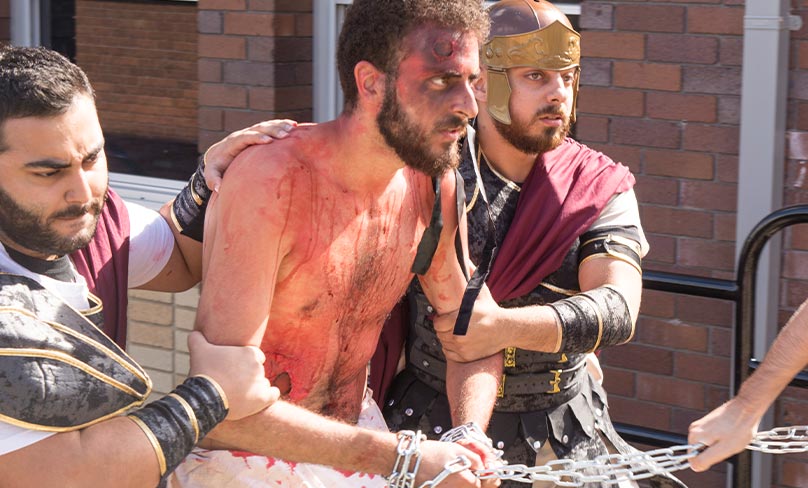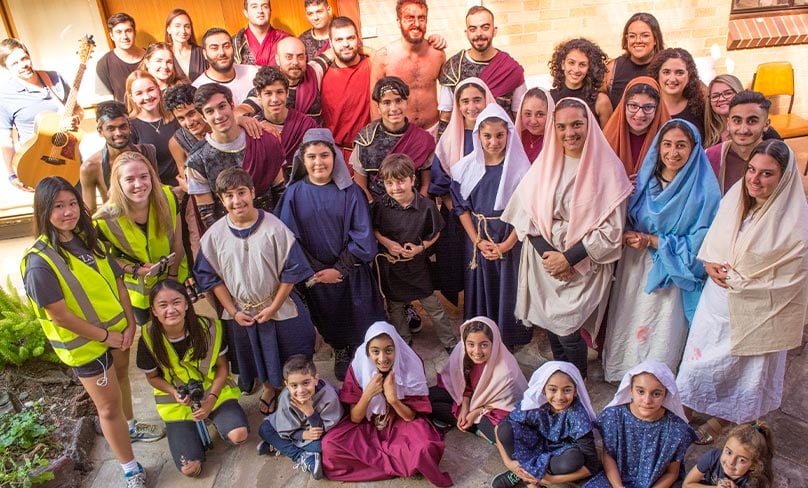
The other week, I published a review of the notorious Passion Of the Christ movie. Some see it as nothing but a vehicle for antisemitism; others call it irredeemable violence porn. Others shudder at the memory of the scourging, but remember the scenes with Mary most vividly.
Some think you can barely call yourself a Catholic if you haven’t watched it yet this year. Others think it’s a stain on the cultural fabric of Catholicism in our time. Some thought it was overwrought and ridiculous; others were shaken to the core.
Related story: Karl Schmude: The Easter yearning
Like many good works of art, it’s something of a Rorschach test: What you get out of it is what you bring to it. The movie is fifteen years old, so I thought I had heard all the possible interpretations of it—until a friend, who is training for a medical career, said that he wanted to re-watch it in light of what he has learned. He said:
I’ve been trying to imagine how I would manage the Son of Man he were turned over to my care right before giving up the ghost: 33 YOM, hypoxic, hypovolemic, probably bradycardic and on the point of fibrillating. By the end of the weekend, when I’ll have finished learning my ACLS patient care algorithms, I’ll have an answer. I’d have my EMT assist with ventilations, after which I’d attach the monitor, administer a normal saline bolus big enough to keep the Son of Man’s BP above 90, and get ready to pace.
That’s new! Doesn’t mean much to me, but I’m glad there are guys like this guy out there, who do think about these things, and who do bring their knowledge of the human body and its frailties to the scene of the disaster, whatever the disaster. This is who he is right now; this is what he would bring. This is what he could give.

It put me in mind of a story I read on The Accidental Talmudist Facebook page. I think you’ll like it:
“An unlearned shepherd used to pray by singing, “Dear G-d, if You have sheep, I will care for Your sheep. If You are hungry, I will give You my radishes. If You’re very hungry, I will give You all my radishes.”
A rabbi walked by and overheard the song.
“Poor man,” thought the rabbi, “No one has ever taught him how to pray”.
The rabbi spent the whole afternoon with the shepherd, teaching him the prayers; when to open his eyes, and when to close, when to stand, sit, bow, whisper, etc.
The shepherd was very grateful and promised to pray properly from now on.
But he quickly forgets the details, and is so afraid he’ll do it wrong, he skips praying altogether.
The next day, however, the shepherd grew very afraid because he couldn’t remember all the details. Rather than pray wrong, he simply did his work.
Up in Heaven, G-d had a terrible day. The universe was scanned, and G-d saw that the shepherd’s prayer was missing.
An angel was dispatched to ask, “Why aren’t you praying?”
The shepherd explained. The angel brought the shepherd to Heaven, where the entire Heavenly court, with all its myriads of angels, had just begun to pray.
Singing as only angels can, half the Heavenly host chanted, “Dear G-d, if you have sheep…”
And the other half answered, “I will care for your sheep!”
“If you are hungry…”
“I will give you my radishes!”
The shepherd wept, understanding at last the importance of his prayer, the prayer of his heart.”
I hope you can set aside the playful elements of this story (“God had a terrible day”) and hear the main point. It is not that ritualised, memorised, formal prayer is wrong or bad or useless. It’s that the shepherd’s prayer was true prayer because he, being who he was, gave what he had to give. He could care for sheep, so he offered that to God. He had radishes, so he offered those to God. And he had a simple prayer of reverence and love, and he offered that to God.
Related story: Bankstown youth lead Passion
The rabbi, being a rabbi, had something else to offer. I don’t suppose he went away and swore off sitting, standing, and bowing while praying; but perhaps he was reminded of why a rabbi might pray that way: Because he is giving what he has, according to who he is.

The shepherd’s prayer and the rabbi’s prayer will both be received if they are offered sincerely—because of who God is. He is the great receiver.
Not long ago, I was in a pretty low spot. A long project I had piled a lot of time, energy, and high hopes into—something I thought would be a really good way of pleasing and serving God with the talents he had given me—came off poorly. It was a tremendous blow, and I felt not only embarrassed and disappointed, but guilty. I had my chance to give something good for God, and I blew it.
I was just about to crawl off to bed, feeling defeated and useless. Happily, a passing angel muttered something my ear: “Offer up your failure.”
And so I did. Why the hell not? I didn’t and don’t even know what it means to do this, or what it’s for. I just balled up all my unhappiness and grief and, with all my mental strength, hurled it in the direction of the cross. Then I cried a little and went to sleep; and the next day, I got on with my life.
Related story: Jesus would have enjoyed a good biryani
Probably I will never know what became of that offering I made. It’s not really my business, any more than it’s my business what a beggar does with my donation or a bride does with the toaster I give her on her wedding day. A gift is a gift! All I know is I gave what I have, and I will forever be glad that I made that gift. Once you put something in God’s hands with sincerity and trust, you are praising God. That is never a waste.
Praising God is what the angels do for eternity, and they haven’t gotten tired of it yet. It hasn’t become pointless yet. It hasn’t run its course yet.
Lent is something of a Rorschach test, itself. If we look closely at it, it shows us who we are right now, and what we have to give to God. Not what we ought to have, what we thought we used to have, what we thought we would have by now. Not what everyone else seems to have, but what we have right now. That is what we should give to him. Radishes, a saline bolus, a crushing failure, or choirs of heavenly.
You shepherds, you rabbis, you medics, you failures: Give what you’ve got to God. What you have is what he wants. What he does with it is none of your business, but you should know that it won’t go to waste.
